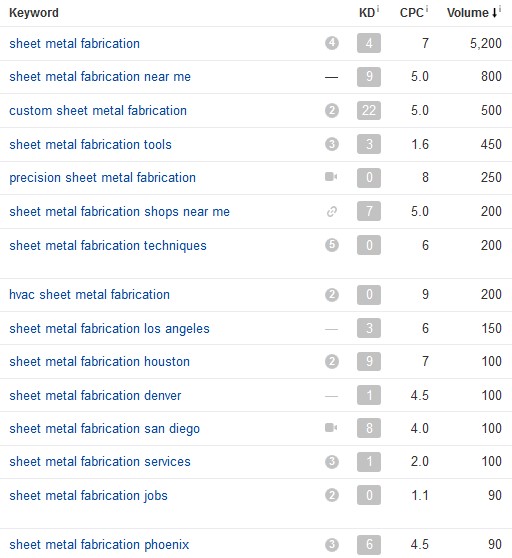Chances are if you’re reading this, you found it on a Google Search result. Or you follow one of our social media channels and clicked the link we shared from Facebook or Twitter. But either way, you found some interest in this topic because of the title, right?
For the purpose of this post, let’s say you found it on a Google search. Why did you find it though? How did this post appear for the question you asked? Keyword Research. That’s the answer.
Manufacturing is one of the broadest and most vague industries out there. What does a manufacturer do, anyway? They manufacture stuff. That “stuff” is the gold to dig for. It could be small metal parts, or turned wood pieces. Or larger components for engines and turbines. Manufacturers could produce prototypes for inventors or use precision laser cutting machines to create side panels for cars. And that’s just the tip of the iceberg on the variance of what a manufacturing company might create.
We have several clients who classify themselves as manufacturers, and not one of them produces even remotely close to the same materials. Which leads back to the purpose of this post: as a manufacturer, how do you get found on Google? It’s not enough to just get found, though – you need to be found for the right terms and by the right people (a.k.a., your buyer persona).
That process is called search engine optimization. There are a few simple parts of a website you can easily optimize on your own. They include:
- Meta Titles - the text that appears in the browser title bar.
- Meta Descriptions – the short paragraph you see on a search result.
- Heading Tags – Snippets of code in a website that denote a hierarchy of content for search engines.
- Body Copy – The rest of the text on a page.
So those are the parts of a page to work on, but what do you need to put there?
This is where keyword research comes into play. There are plenty of tools out there you can do research with. Some free, others not. My personal favorite is Ahrefs Keyword Explorer. This is a paid service, but well worth it. Paid tools will obviously offer more features and better data. For a free tool, check out AdWords’ Keyword Planner. It does require a Google Account since it’s meant for advertisers looking for terms to bid on, but anyone can use it for free - no credit card or AdWords account required.
First things first
What do you manufacture, specifically? Jot down a short list of the products your company makes. It doesn’t have to be exhaustive. Just a handful of terms will work just fine for starters. For example, let’s say your company specializes in Sheet Metal Fabrication, Tool & Die Build, and Short Run Progressive Stamping. Enter those into your keyword research tool of choice. Here’s what Ahrefs returned:

These are sorted by most to least search volume. The KD column stands for Keyword Difficulty, which is an estimate of how hard it would be to rank for that term in the Top 10. The range is from 1 to 100, with higher being more difficult. The CPC column is an estimate of how much a click for this term would cost if you were to bid on it in a pay-per-click (PPC) campaign.
Pro Tip: Target terms with a keyword difficulty less than 50, and search volume greater than 100 per month. This will provide your greatest chance to rank for that term over time.
These are the top 15 results related to Sheet Metal Fabrication out of over 1,400. In just this short list, we can see great information. People are searching for “custom” more than they are “precision.” HVAC is a popular search as well – so if your company fabricates sheet metal for the HVAC industry, it would probably be worthwhile to have a page dedicated entirely to that service. Also, “tools” and “techniques” are highly searched. Those may feed into blog topic ideas. Finally, there are searches for specific locations. You would want your location – or the nearest metropolitan area, present on your site as well.
This is just one term, and it returned over a thousand related queries. Do this for the handful of services you wrote down, and you’ll be off to the races in no time, neck deep in keyword research. Over time, you’ll get a handle on what terms are good to optimize for and which are not related at all. You can use keyword research to discover terms to optimize your website for and terms to write blog posts around.
Happy researching!